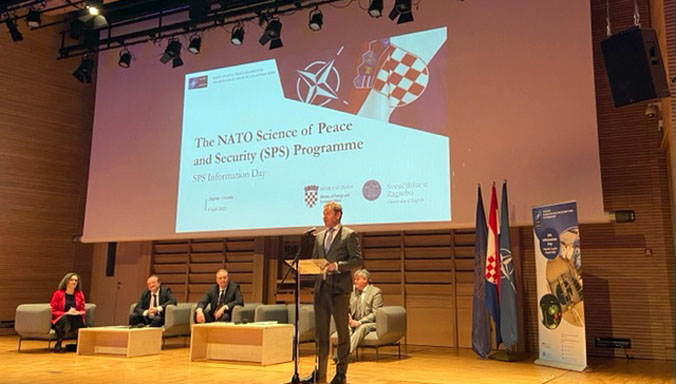An Information Day took place in Zagreb on Friday (8 April 2022), marking the important achievements accomplished by Croatia in the framework of the NATO Science for Peace and Security (SPS) Programme. Scientists, experts, and government representatives met to take stock of the results of civil scientific cooperation attained amongst Croatia, NATO Allies, and partner countries. They also shared views on the prospects for potential new activities in security-related science and technological innovation, in line with Croatia's research priorities.

Over 60 participants attended the event, which was jointly organized by the NATO Science for Peace and Security Programme, the Croatian Ministry of Foreign and European Affairs, the Permanent Delegation of Croatia to NATO, and the University of Zagreb. It was also streamed online to link up several other universities in the country, including in Dubrovnik, Osijek and Split.
At the official opening, NATO Assistant Secretary General for Emerging Security Challenges, David van Weel, stated: "The Science for Peace and Security Programme is a central component of NATO's science and technology ecosystem, and it has been for over 60 years. During this time, it has helped to demonstrate NATO's commitment to scientific and technological advancement." Representing the host country, State Secretary Frano Matušić highlighted Croatia's participation in 78 SPS projects in collaboration with Allies and partners from around the globe. He also stressed the importance of this Information Day to strengthen and expand future cooperation. At the margins of the event, Croatian research teams displayed various prototypes developed with support from the NATO Science for Peace and Security Programme, demonstrating their ability to address a wide range of contemporary security challenges and offer solutions with tangible deliverables. These include initiatives such as the development and deployment of the Next-generation Incident Command System (NICS), a web-based command and control software that facilitates collaboration among first responders during natural and man-made disasters. Experts from Bosnia and Herzegovina, Montenegro, Croatia, and North Macedonia, as well as the United States, worked together to implement and test this platform across the region, putting it to use in a variety of crisis scenarios.
Research and development activities supported by the NATO Science for Peace and Security Programme have helped to identify innovative solutions to other security challenges of particular relevance, such as the detection of landmines and explosive hazards, as well as technological solutions to enhance security at border crossing points, airports and seaports. Moreover, events such as the yearly Zagreb Security Forum have fostered the exchange of lessons learned and expertise on hybrid challenges and resilience amongst a network of experts and officials in eastern and south eastern Europe.
Through interactions with their peers from other NATO Allies and partner countries, Croatian scientists and experts have taken part in many activities within the framework of NATO's Science for Peace and Security Programme, on such security-related topics as counter-Terrorism, cyber defence, defence against chemical, biological, radiological and nuclear agents, environmental security, advanced technology, mine and unexploded ordnance clearance and detection, and hybrid challenges.
With the recent launch of a new call for applications






